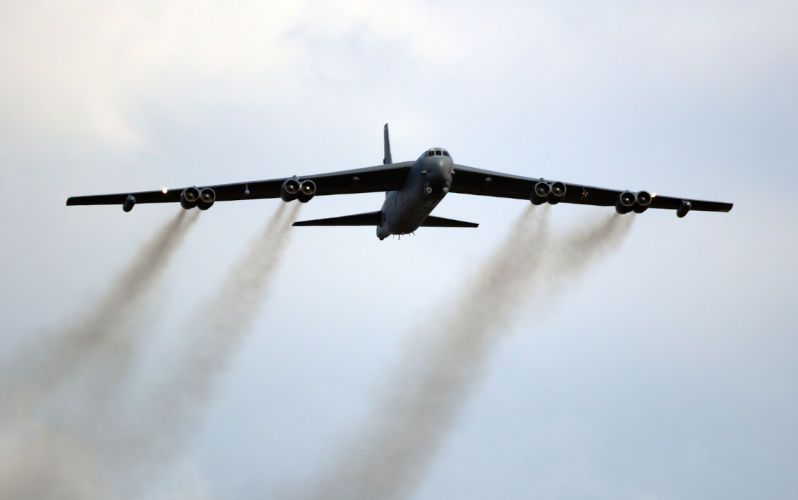‘They will tell me.’ Malcolm Fraser’s Cold War nuclear heterodoxy and Labor’s willed ignorance today
August 31, 2024
The United States Government doctrine of neither confirming nor denying the presence or absence of nuclear weapons on board US aircraft has been virtually unchanged in almost 70 years, with a very small number of exceptions.
One key element of transparency required for democratic accountability is denied by acceptance of the US doctrine of neither confirming nor denying to the public the presence of nuclear weapons on USAF aircraft, and, also it would appear, to the governments of countries such as Australia, Spain, the United Arab Emirates and the United Kingdom that frequently host the deployment of USAF B-52H aircraft.
In early 2023, in response to questions about the possible presence of either nuclear-capable or nuclear-armed US aircraft entering Australia, Australian Foreign Minister Penny Wong confirmed the Government’s commitment to acting in conformity with all of Australia’s obligations under international law in relation to nuclear weapons.
Wong reiterated that, in relation to the possible nuclear-armed B-52 rotational deployments, the Australian Government “respects and understands” the United States policy of neither confirming nor denying the presence of nuclear weapons on any of its ships or aircraft. Furthermore, Wong refused to disclose even whether any of the B-52s on rotational deployment to Tindal would be nuclear-capable or conventional-only aircraft.
‘The responsible way of handling this is to recognise that the US has a ’neither confirm nor deny position’ which we understand and respect."
There is one important example of a leader of an allied country hosting B-52s extracting a public declaration from the United States in contradiction to what the US maintained was its worldwide policy of neither confirming nor denying the presence of nuclear weapons on its aircraft.
In February 1979, the Australian Government, headed by Prime Minister Malcolm Fraser, authorised B-52 low-level terrain avoidance training flights over northern Australia. A year later, in March 1981, the Fraser Government further authorised B-52 landings at RAAF Base Darwin for training flights, and B-52 maritime surveillance flights over the Indian Ocean staging through Darwin.
Completely obviating the worldwide US doctrine of neither confirm nor deny, on 11 March 1981 Fraser informed the Australian Parliament that B-52s on both missions were unarmed and carried no bombs; that nuclear weapons would not be allowed into Australia without the prior and explicit agreement of the Australian Government; and that any modification of the two missions would also require prior explicit approval. Any modification of the two missions, Fraser promised, would be publicly announced.
Fraser subsequently incorporated into the parliamentary record a 28 March 1981 statement from the United States embassy in Canberra confirming these elements of the agreement, which left no doubt about the US Government’s public acceptance of compliance with the Australian “unarmed and carry no bombs” policy.
Two years later, the Commander in Chief Pacific’s _1982 Command History_ made clear CINCPAC’s unhappiness with this contradiction of what it termed,
“the standard worldwide US practice of neither confirming nor denying the presence of nuclear weapons”.
Not only, the 1982 Command History noted, had these conditions been imposed by the Fraser Government during protracted negotiations in 1979-80, but that in political and diplomatic terms, there was no question of the Fraser Government removing these conditions subsequently.
The Australian case between 1980 and 1991 appears unique, insofar as three conditions were successfully required of the Carter administration and the incoming Reagan administration by the Fraser government:
- the US informs the host government;
- the host government informs the host country public; and
- the US confirms the host’s stated understanding in public.
At the height of Cold War tensions following the Soviet invasion of Afghanistan and the fall of the Shah of Iran, Fraser took his Government’s decision to be fully informed about the tactical and strategic objectives of B-52 missions in Australia, including knowledge about the weaponry they carried, to be a matter of national sovereignty. An armed mission launched from Darwin would plainly have serious strategic implications for Australia.
Consequently, Fraser informed Parliament on 12 March that:
“It would be quite wrong, a derogation of Australia’s sovereignty and a derogation of responsibility of this Government and this Parliament, if any government were to agree to such a mission if the government did not agree with the objectives of the mission.”
When questioned about whether the United States would withhold such information from Australia, Fraser, characteristically, replied that “They will tell me”.
And clearly the US did so, to its chagrin. But that Australian precedent has not been followed by Fraser’s successors today.
View the full report: https://nautilus.org/wp-content/uploads/2024/08/Nuclear-capable-B-52H-Stratofortress-final-23-08-2024.pdf
See the Press Information Kit, including visuals and quotes: https://nautilus.org/wp-content/uploads/2024/08/Press-Information-Kit-final-v4-1.pdf

